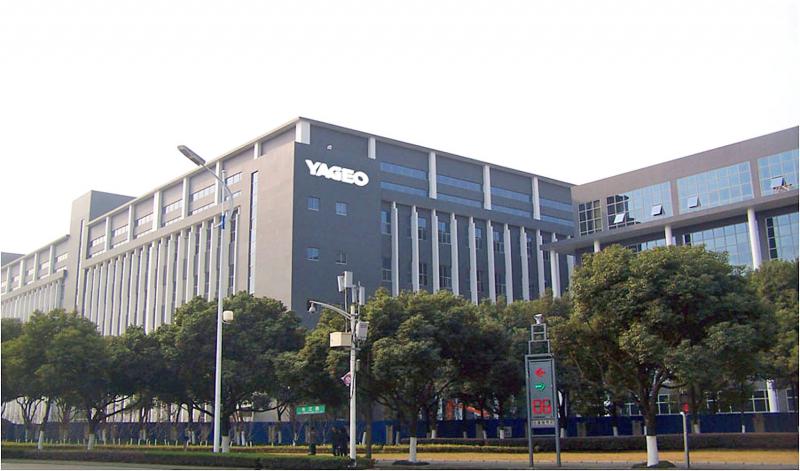Yageo Corp (國巨), a maker of passive components, yesterday reported consolidated revenue of NT$10.53 billion (US$356.78 million) for last month, up 3.8 percent month-on-month and 14.4 percent year-on-year, amid stable demand from major customers and an easing of COVID-19 lockdowns in China’s Kunshan and Shanghai, the company said in a statement.
Yageo’s products include multilayer ceramic capacitors (MLCCs), tantalum capacitors and chip resistors.
It is the world’s third-largest supplier of MLCCs.

Photo: Chang Hui-wen, Taipei Times
Last month’s sales were the highest for May in the company’s history, Yageo data showed.
The company said it remained cautiously optimistic about its sales outlook after Kunshan and Shanghai eased their lockdowns, which had allowed its customers to resume operations and restart shipments.
“Overall, the production and operations of the company’s plants in China remain normal,” Yageo said.
In the first five months of this year, cumulative revenue reached NT$50.8 billion, an annual increase of 21.1 percent, it said.
Separately, Airtac International Group (亞德客), a supplier of pneumatic components, reported consolidated revenue of NT$2.65 billion for last month, up 17 percent from a month earlier, and 18.6 percent from a year earlier as most cities in China gradually relaxed pandemic regulations.
Airtac’s products are used in the production of electronic equipment, general machinery, packaging, automotive devices, batteries, construction equipment and machine tools.
Shipments for the battery, automotive, energy, lighting equipment and electronics industries posted higher growth rates last month, the company said in a regulatory filing.
“As we predicted, the adverse impact of the disease controls on shipments is a short-term phenomenon, and demand has merely been deferred to the coming weeks,” Airtac said. “Current orders are still higher than shipments ... so the company is maintaining its 110 percent utilization rate to increase inventory to meet demand.”
Combined revenue from January to last month grew 7.8 percent year-on-year to NT$11.42 billion, it said.
Meanwhile, BizLink Holding Inc (貿聯控股) on Monday reported that consolidated revenue surged 90.34 percent year-on-year last month to US$157.82 million, the highest monthly sales in the company’s history as customers started to stock up after supply chains gradually returned to pre-lockdown levels.
“Our Kunshan facility [last month] fully resumed normal operations, ramped up production and restarted shipments to customers to catch up on the volume impact from the April lockdown,” Silicon Valley-headquartered BizLink, the sole supplier of wiring harnesses for battery management systems in Tesla Inc’s electric vehicles, said in a statement.
The company’s product portfolio includes components for information technology, consumer electronics and electrical appliances, as well as industrial, automotive, medical, solar and telecom equipment.
Shipments of components used in industrial equipment rose last month due to inventory buildup at its customers, while those for automotive devices and information technology applications showed a steady recovery in shipments, BizLink said.
However, shipments of products used in electrical appliances slowed due to component shortages and longer lead times, while its new German business unit INBG reported weak shipments of telecommunication products for the same reason, BizLink said.
It completed the acquisition of industrial solutions unit INBG from Leoni AG in January, which accounted for 39 percent of its total sales last month, it said.
Combined sales in the first five months increased 89.41 percent year-on-year to US$721.98 million, BizLink said.

South Korea’s equity benchmark yesterday crossed a new milestone just a month after surpassing the once-unthinkable 5,000 mark as surging global memory demand powers the country’s biggest chipmakers. The KOSPI advanced as much as 2.6 percent to a record 6,123, with Samsung Electronics Co and SK Hynix Inc each gaining more than 2 percent. With the benchmark now up 45 percent this year, South Korea’s stock market capitalization has also moved past France’s, following last month’s overtaking of Germany’s. Long overlooked by foreign funds, despite being undervalued, South Korean stocks have now emerged as clear winners in the global market. The so-called “artificial intelligence

NEW IDENTITY: Known for its software, India has expanded into hardware, with its semiconductor industry growing from US$38bn in 2023 to US$45bn to US$50bn India on Saturday inaugurated its first semiconductor assembly and test facility, a milestone in the government’s push to reduce dependence on foreign chipmakers and stake a claim in a sector dominated by China. Indian Prime Minister Narendra Modi opened US firm Micron Technology Inc’s semiconductor assembly, test and packaging unit in his home state of Gujarat, hailing the “dawn of a new era” for India’s technology ambitions. “When young Indians look back in the future, they will see this decade as the turning point in our tech future,” Modi told the event, which was broadcast on his YouTube channel. The plant would convert

‘SEISMIC SHIFT’: The researcher forecast there would be about 1.1 billion mobile shipments this year, down from 1.26 billion the prior year and erasing years of gains The global smartphone market is expected to contract 12.9 percent this year due to the unprecedented memorychip shortage, marking “a crisis like no other,” researcher International Data Corp (IDC) said. The new forecast, a dramatic revision down from earlier estimates, gives the latest accounting of the ongoing memory crunch that is affecting every corner of the electronics industry. The demand for advanced memory to power artificial intelligence (AI) tasks has drained global supply until well into next year and jeopardizes the business model of many smartphone makers. IDC forecast about 1.1 billion mobile shipments this year, down from 1.26 billion the prior

People stand in a Pokemon store in Tokyo on Thursday. One of the world highest-grossing franchises is celebrated its 30th anniversary yesterday.